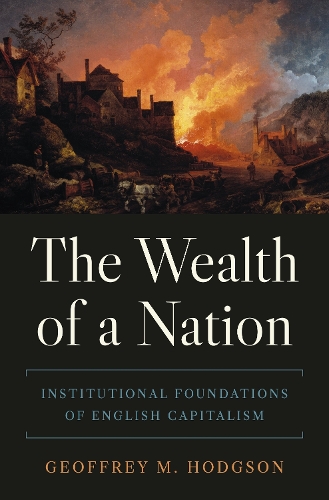
The Wealth of a Nation: Institutional Foundations of English Capitalism
(Paperback)
Available Formats
Publishing Details
The Wealth of a Nation: Institutional Foundations of English Capitalism
By (Author) Geoffrey M. Hodgson
Princeton University Press
Princeton University Press
25th February 2026
United States
Classifications
Tertiary Education
Non Fiction
Capitalism
330.122
Physical Properties
Paperback
304
Width 156mm, Height 235mm
Description
How the development of legal and financial institutions transformed Britain into the world's first capitalist country.
Modern capitalism emerged in England in the eighteenth century and ushered in the Industrial Revolution, though scholars have long debated why. Some attribute the causes to technological change while others point to the Protestant ethic, liberal ideas, and cultural change. The Wealth of a Nation reveals the crucial developments in legal and financial institutions in the seventeenth and eighteenth centuries that help to explain this dramatic transformation.
Offering new perspectives on the early history of capitalism, Geoffrey Hodgson describes how, for the emerging British economy, pressures from without were as important as evolution from within. He shows how intensive military conflicts overseas forced the state to undertake major financial, administrative, legal, and political reforms. The resulting institutional changes not only bolstered the British war machine - they fostered the Industrial Revolution. Hodgson traces how Britain's war capitalism led to an expansion of its empire and a staggering increase in the slave trade, and how the institutional innovations that radically transformed the British economy were copied and adapted by countries around the world.
A landmark work of scholarship, The Wealth of a Nation sheds light on how external factors such as war gave rise to institutional arrangements that facilitated finance, banking, and investment, and offers a conceptual framework for further research into the origins and consolidation of capitalism in England.
Reviews
"Geoffrey M. Hodgsons book is a groundbreaking, in-depth analysis of the ever-discussed history of English capitalism. Well-written and accessible even to broader readers, the book contributes actively to the ongoing debate about the rise of modern capitalism in Europe and worldwide."---Giampaolo Conte, The Journal of European Economic History
"Hodgsons book is a substantial contribution to the field of economic history, providing a nuanced understanding of the complex interplay between state power, military needs, financial innovations and the institutional foundations of capitalism."---Mugur Tolici, Central Banking
Author Bio
Geoffrey M. Hodgson is professor emeritus in management at Loughborough University London and editor-in-chief of the Journal of Institutional Economics. His many books include Liberal Solidarity, Conceptualizing Capitalism, and Darwin's Conjecture.
